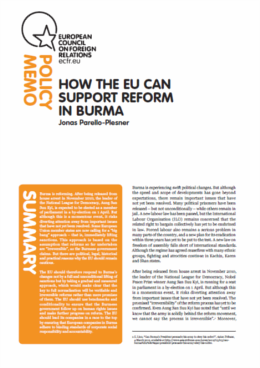How the EU can support reform in Burma
Europe can help Burma reform, but its help must be gradual
Is Burma really coming in from the cold? How Europe can help
On 1st April Burma will hold parliamentary elections that are likely to see opposition leader and Nobel Prize winner Aung San Suu Kyi win a seat. The country is undergoing swift political and societal changes after decades of military rule, and the government says the reforms are ‘irreversible’. Some now argue that the EU needs to lift all its sanctions right away.
Aung San Suu Kyi’s election is a momentous event, yet it risks diverting attention from many unresolved issues. Some political prisoners remain in jail, forced labour is still a serious problem, and fighting continues in several states. The European Union has a unique chance to ensure that Burma’s reforms to take root.
In a new ECFR publication, ‘How the EU can support reform in Burma’, Jonas Parello Plesner argues that the EU should adopt a coherent approach that involves:
- Gradually lifting sanctions in line with clear, agreed benchmarks. Lifting sanctions too quickly would result in the EU losing its leverage and means to support Burmese reformers. Visa bans on the government have already been lifted, but further lifting needs to be gradual, and follow verifiable, irreversible signs of reform.
- Offering institutional capacity building & development assistance to support progress towards benchmarks and increase the numbers of Burmese that benefit from reform. Development assistance should be linked to governance standards and to dialogue with civil society and the authorities.
- Shaping a new, sustainable business approach for foreign investment. An EU- Burma business summit involving European businesses and NGOs should agree high and accountable standards to encourage a ‘race to the top’ for business entry in Burma. This should be expanded to include business partners in ASEAN, US, Japan and China.
Jonas argues that such measures are necessary to ensure that reform is genuine and has solid foundations. He says there are four reasons to be wary of Burmese government claims that the reforms are irreversible:
- Political: the reformers’ political position is insecure, and other key powerbrokers see further deep reforms as against their interests.
- Legal: reforming laws (especially through a relatively new parliament) takes time and is very complex.
- Historical: earlier openings have been followed by crackdowns and renewed isolation.
- Practical: The reforms so far don’t affect the military’s role behind the scenes. The military is still deeply entrenched, holds 25% of parliamentary seats and wields an effective veto over constitutional amendments.
The European Council on Foreign Relations does not take collective positions. ECFR publications only represent the views of their individual authors.



